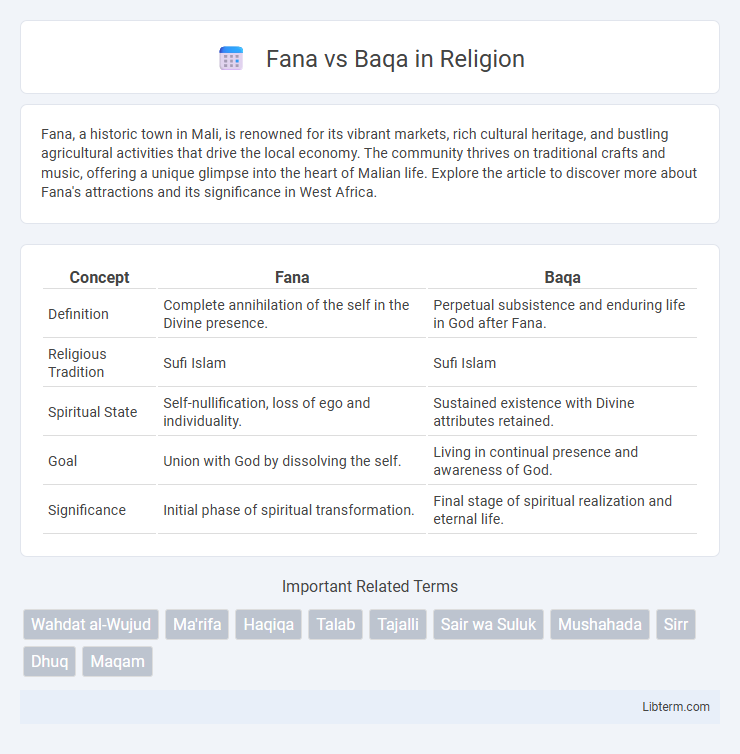Fana, a historic town in Mali, is renowned for its vibrant markets, rich cultural heritage, and bustling agricultural activities that drive the local economy. The community thrives on traditional crafts and music, offering a unique glimpse into the heart of Malian life. Explore the article to discover more about Fana's attractions and its significance in West Africa.
Table of Comparison
| Concept | Fana | Baqa |
|---|---|---|
| Definition | Complete annihilation of the self in the Divine presence. | Perpetual subsistence and enduring life in God after Fana. |
| Religious Tradition | Sufi Islam | Sufi Islam |
| Spiritual State | Self-nullification, loss of ego and individuality. | Sustained existence with Divine attributes retained. |
| Goal | Union with God by dissolving the self. | Living in continual presence and awareness of God. |
| Significance | Initial phase of spiritual transformation. | Final stage of spiritual realization and eternal life. |
Introduction to Fana and Baqa
Fana and Baqa are fundamental concepts in Sufi mysticism representing stages of spiritual realization. Fana refers to the annihilation of the self or ego, where an individual dissolves their identity to achieve unity with the Divine essence. Baqa follows Fana, signifying the state of subsistence wherein the individual lives in continuous awareness of God while maintaining their distinct existence.
Historical Roots of Fana and Baqa
Fana and Baqa are fundamental concepts in Sufi philosophy representing annihilation of the self and subsistence in God, respectively. Historically, Fana traces back to early Islamic mystics like Al-Junayd, emphasizing ego dissolution through spiritual practice. Baqa emerged as the complementary stage where the soul remains in divine presence, reflecting ongoing existence beyond selfhood.
Definitions: Understanding Fana
Fana refers to the Sufi concept of annihilation of the self, where an individual's ego and personal identity dissolve to achieve union with the Divine essence. This spiritual state involves the complete absorption into God's presence, transcending the limitations of the physical self and temporal world. Understanding Fana is crucial for comprehending the transformative journey in Sufism towards ultimate oneness and enlightenment.
Definitions: Unpacking Baqa
Baqa, in Islamic mysticism, refers to the state of subsistence or permanence following Fana, which denotes the annihilation of the self. While Fana involves the dissolution of the ego and temporal self, Baqa signifies the enduring presence within the divine reality, reflecting continuous spiritual existence. This concept emphasizes the believer's sustained union with God, embodying eternal life beyond individual selfhood.
Fana and Baqa in Sufi Philosophy
Fana in Sufi philosophy refers to the annihilation of the self and the ego, leading to the dissolution of individual identity into the divine presence. Baqa represents the state of subsistence or permanence where the individual exists in unity with God after achieving fana. These concepts illustrate the transformative spiritual journey from self-negation to eternal spiritual existence in Sufism.
The Stages of Spiritual Journey
Fana represents the stage in the Sufi spiritual journey where the self is annihilated, leading to union with the Divine essence, while Baqa denotes the subsequent phase of subsistence or enduring existence in God's presence. During Fana, the seeker transcends ego and worldly attachments, experiencing a dissolution into divine reality. Baqa follows as the return to the world, embodying spiritual realization through conscious, sustained divine presence and active engagement in life.
Fana: The Annihilation of Self
Fana, in Sufi mysticism, represents the profound spiritual state of self-annihilation where the individual ego dissolves completely, allowing unity with the Divine. Unlike Baqa, which signifies subsistence or eternal life in God's presence, Fana emphasizes the temporary disappearance of the self to transcend worldly attachments and achieve ultimate spiritual realization. This annihilation of self is considered the essential prerequisite for reaching Baqa, marking the transformative journey toward divine immortality.
Baqa: The State of Subsistence
Baqa, known as the State of Subsistence in Sufi philosophy, represents the enduring existence of the self in unity with divine reality after the experience of Fana, or annihilation. This state signifies the permanent, conscious presence of spiritual life that coexists with God's essence, emphasizing continuous surrender and divine presence. Baqa is characterized by a sustained, harmonious existence where the soul fully embodies spiritual truth and God's attributes, transcending individual ego while maintaining identity within divine love.
Key Differences Between Fana and Baqa
Fana and Baqa are core concepts in Sufism representing stages of spiritual realization; Fana refers to the annihilation of the self or ego, where the individual self is dissolved in God, symbolizing the loss of personal identity. Baqa follows Fana and denotes the state of subsistence or continued existence in God, where the individual lives in alignment with divine presence while maintaining consciousness. The key difference lies in Fana's focus on ego dissolution and unity with the divine essence, whereas Baqa emphasizes stable, conscious living within divine reality after this union.
Practical Implications in Modern Spirituality
Fana, the concept of ego annihilation in Sufism, emphasizes dissolving the self to achieve unity with the Divine, fostering deep spiritual transformation and liberation from worldly attachments. Baqa, representing subsistence or abiding in God post-fana, encourages sustained spiritual presence and active engagement with the world through divine attributes, enabling practical compassion and ethical living. Modern spirituality integrates these principles by promoting mindful selflessness (fana) alongside intentional presence (baqa), supporting holistic personal growth and balanced social interactions.
Fana Infographic

 libterm.com
libterm.com